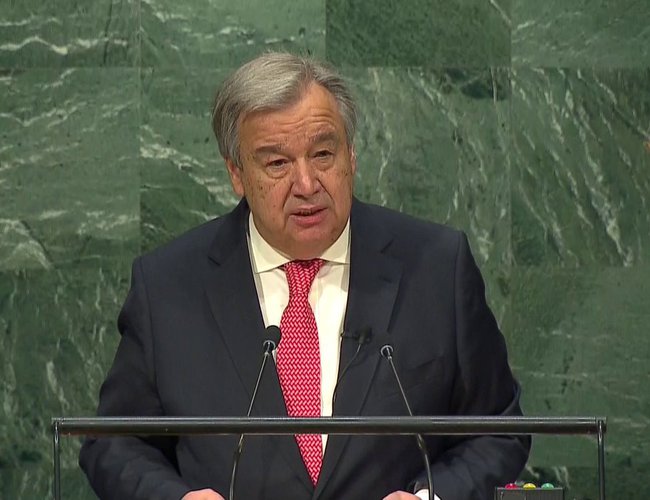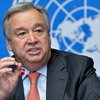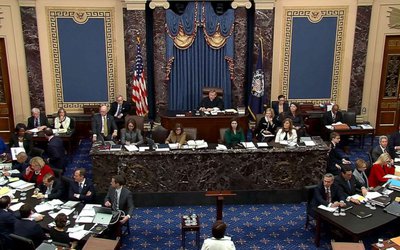
Our world is suffering from a bad case of “Trust Deficit Disorder”. People are feeling troubled and insecure. Trust is at a breaking point. Trust in national institutions. Trust among states. Trust in the rules-based global order.
Within countries, people are losing faith in political establishments, polarization is on the rise and populism is on the march.
Among countries, cooperation is less certain and more difficult. Divisions in the Security Council are stark.
Trust in global governance is also fragile, as 21st-century challenges outpace
20th-century institutions and mindsets.
We have never had a true system of global governance, much less a fully democratic one.
Still, across many decades, we established solid foundations for international cooperation.
We came together as united nations to build institutions, norms and rules to advance shared interests.
We raised standards of living for millions, forged peace in troubled lands and indeed — avoided a third world war.
But none of this can be taken for granted.
Today, world order is increasingly chaotic. Power relations are less clear. Universal values are being eroded.
Democratic principles are under siege. The rule of law is being undermined.
Impunity is on the rise, as leaders and states push the boundaries at home and in the international arena.
We face a set of paradoxes.
The world is more connected, yet societies are becoming more fragmented. Challenges are growing outward, while many people are turning inward. Multilateralism is under fire precisely when we need it most.
It is true that we are moving in the direction of a multipolar world.
But multipolarity will not, in itself, guarantee peace or solve global problems. A century ago, Europe was multipolar. A balance of power was deemed
sufficient to keep rivals in check.
It was not. Without strong multilateral frameworks for European-wide cooperation and problem-solving, the result was a grievous world war.
Today, with shifts in the balance of power, the risk of confrontation may increase.
In assessing the Peloponnesian War in ancient Greece, Thucydides said, and I quote, “It was the rise of Athens and the fear that this instilled in Sparta that made war inevitable.”
This is what the political scientist Graham Allison calls the “Thucydides Trap”. But in his book “Destined for War”, reviewing many examples of rivalry in the past, he concluded that conflict is never inevitable.
Indeed, with leadership committed to strategic cooperation and to managing competing interests, we can avoid war and steer the world onto a safer path.
Individual leaders have the duty to advance the well-being of their people.
But it runs deeper. Together, as guardians of the common good, we also have a duty to promote and support a reformed, reinvigorated and strengthened multilateral system.
We need renewed commitment to a rules-based order, with the United Nations at its centre and with the different institutions and treaties that bring the Charter to life.
And we need to show the added value of international cooperation by delivering peace, defending human rights and driving economic and social progress for women and men everywhere.
That is why I am so committed to reform, and to making the United Nations more effective in responding to the needs and aspirations of “we the peoples”.
In the face of massive, existential threats to people and planet -- but equally at a time of compelling opportunities for shared prosperity -- there is no way forward but collective, common-sense action for the common good.
This is how we rebuild trust. In my address last year, I highlighted seven challenges. One year on, they remain sadly unresolved.
There is outrage at our inability to end the wars in Syria, Yemen and elsewhere. The Rohingya people remain exiled, traumatized and in misery, still yearning for safety and justice. Palestinians and Israelis are still locked in endless conflict, with the two-state solution more and more distant.
The threat of terror looms, fed by the root causes of radicalization and violent extremism. And terrorism is ever more interlinked with international organized crime and the trafficking of people, drugs and arms.
The nuclear peril has not eased, with non-proliferation at serious risk. Nuclear- armed States are modernizing their arsenals. A new arms race could be triggered, and the threshold for their use lowered.
We have seen outrageous uses of chemical weapons, in full impunity despite their ban. Protections against dangerous biological weapons are weak. Inequality is undermining faith in the social contract and is a clear obstacle to the achievement of the Sustainable Development Goals. Tensions over trade are on the rise.
Migrants and refugees continue to face discrimination and demagoguery in the context of clearly insufficient international cooperation. And in this year marking the 70th anniversary of the Universal Declaration of Human Rights, the human rights agenda is losing ground and authoritarianism is on the rise.
As the politics of pessimism spreads, we must guard against self-fulfilling prophecies.Those who see their neighbors as dangerous may cause a threat where there was none.
Those who close their borders to regular migration only fuel the work of traffickers.And those who ignore human rights in combatting terrorism tend to breed the very extremism they are trying to end.
It is our common duty to reverse these trends and resolve these challenges. We need to move ahead based on facts, not fear — on reason, not illusion. Prevention must be at the centre of all we do.
This session of the General Assembly is a real opportunity for progress.
To mention just one example, I welcome the strong show of support for my Action for Peacekeeping Initiative – which has been endorsed by over 146 states and regional organizations. It aims to help our missions succeed in today’s protracted and volatile contexts.
But today I want to concentrate on two epochal challenges which, since last year, have taken on surpassing urgency: climate change and the new risks associated with advances in technology.
Let me take them each in turn. Ladies and Gentlemen,
First, the direct existential threat of climate change. We have reached a pivotal moment. If we do not change course in the next two years, we risk runaway climate change.
Climate change is moving faster than we are – and its speed has provoked a sonic boom SOS across our world. According to the World Meteorological Organization, the past two decades included 18 of the warmest years since record-keeping began in 1850.
This year, for the first time, thick permanent sea ice north of Greenland began to break up.
The concentration of carbon dioxide in the atmosphere is the highest in 3 million years – and rising.
Making matters worse, we — as a community of world leaders — are not doing enough. We must listen to the earth’s best scientists. We must see what is happening before our eyes.
We need greater ambition and a greater sense of urgency.
We must guarantee the implementation of the Paris Agreement.
It has immense potential to set us on the right course, but its targets -- which represent the bare minimum to avoid the worst impacts of climate change -- are far from being met. I am concerned that recent negotiations in Bangkok towards implementation guidelines ended without sufficient progress.
The next Conference of Parties, COP24 in Poland in December, will be a key moment. It must be a success. As I said recently, we cannot allow Katowice to remind us of the divisions among Member States that paralyzed Copenhagen.
The good news is: technology is on our side. Clean energy is more affordable and competitive than ever. If we pursue the right path, climate action could add $26 trillion to the global economy by 2030.
Green economy policies could create 24 million new jobs. More and more companies and investors are finding that green business is good business.
Far from being a fundamental threat to the economy, climate action is generating new industries, new markets, more jobs and less dependency on fossil fuels.
The real danger is not the threat to one’s economy that comes from acting. It is, instead, the risk to one’s economy by failing to act. Governments need to be courageous and smart.
That means ending trillions of dollars in subsidies for fossil fuels. It means establishing an adequate price for carbon.
It means stopping investments in unsustainable infrastructure that lock in bad practices for decades to come. Our future is at stake. Nothing is immune -- climate change affects everything– and everything can be undermined. Keeping our planet’s warming to well below 2 degrees is essential for global prosperity and the security of nations.
That is why, next September, I will convene a Climate Summit to mobilize action and finance. We will bring together countries and cities, the real economy and real politics, business, finance and civil society, to focus on the heart of the problem.The Summit will take place one year before countries have to enhance their national climate pledges under the Paris Agreement.
Only a significantly higher level of ambition will do – and the Summit will be an opportunity for leaders and partners to showcase their ambition.
For this to be possible, we must act today.
The world needs you to be climate champions. Excellencies,
Let me now turn to new technologies and what we can do to uphold their promise and keep their perils at bay.
And there is great promise. Scientific progress has helped to cure deadly diseases, feed growing populations, drive economic growth and connect businesses, communities, families and friends across the world.
Rapidly developing fields such as artificial intelligence, blockchain and biotechnology have the potential to turbocharge progress towards the Sustainable Development Goals.
Artificial Intelligence is connecting people across languages, and supporting doctors in making better diagnoses. Driverless vehicles will revolutionize transportation. But there are also risks and serious dangers.
Technological advances may disrupt labour markets as traditional jobs change or disappear, even as the number of young job-seekers continues to grow. Re- training will be needed at previously unimaginable scales. Education must adapt, from the earliest grades. The very nature of work will change. Governments may have to consider stronger social safety net programmes, including, possibly, universal basic income. At the same time, technology is being misused by terrorists and for sexual exploitation and abuse.
Organized criminal networks lurk on the dark web, profiting from encryption and near-anonymous cryptocurrency payments to traffic in people and illegal goods.
Some reports estimate that cybercrime is now putting $1.5 trillion in the pockets of cybercriminals annually. Malicious acts in cyberspace – such as disinformation campaigns -- are polarizing communities and diminishing trust among States.
And more and more people are getting their information from news or social media feeds that echo their views, reinforce tribalism and assure people that they are right and the other side is wrong. The digital revolution is also being used to discriminate against women and reinforce our male-dominated culture.
Indeed, there is a deep gender gap in access to digital technologies, widening the digital divide. We must dismantle obstacles and create opportunities for women, ensure equality fand change on-line and toxic corporate cultures. The technology sector must open up and become more diverse – not least for its own benefit.
With technology outracing institutions, cooperation between countries and among stakeholders will be crucial, including Member States, the private sector, research centres, civil society and academia.
There are many mutually beneficial solutions for digital challenges. We urgently need to find and apply them.
At the United Nations, we are harnessing technologies in support of the Sustainable Development Goals. We are creating innovation labs, including in my office. And in July I established a High-Level Panel on Digital Cooperation, a dialogue platform for all key actors.
The impacts of new technologies on warfare are a direct threat to our common responsibility to guarantee peace and security. The weaponization of artificial intelligence is a growing concern.
The prospect of weapons that can select and attack a target on their own raises multiple alarms — and could trigger new arms races.
Diminished oversight of weapons has implications for our efforts to contain threats, prevent escalation and adhere to international humanitarian and human rights law. Let’s call it as it is. The prospect of machines with the discretion and power to take human life is morally repugnant.
Heaven forbid, any new war could very well include with a massive cyberattack not only targeting military capacities, but also critical civilian infrastructure.
I am encouraged by the ten possible guiding principles elaborated in Geneva last month by the Group of Governmental Experts on Lethal Autonomous Weapons Systems.
More work on these issues, aimed at building trust between and within nations, will be needed if we are to ensure responsible use of new technologies.
I urge you to use the United Nations as a platform to draw global attention to these crucial matters and nurture a digital future that is safe and beneficial for all.
Despite the chaos and confusion of our world, I see winds of hope blowing around the globe.
Just days ago, I witnessed the signing of a historic peace agreement between the leaders of Ethiopia and Eritrea in Saudi Arabia. Soon after, the presidents of Djibouti and Eritrea met in Jeddah to launch a peace process. Eritrea and Somalia have established diplomatic relations.
And in the same region, in the context of a summit of the Intergovernmental Authority on Development, the two rival leaders in South Sudan have finally signed a peace agreement. I am hopeful that these efforts will continue to be consolidated so that the people of the Horn of Africa can finally turn the page on war and conflict.
The courageous initiative of the Singapore Summit between the leaders of the United States and the Democratic People’s Republic of Korea, along with the recent meeting of the two Korean leaders in Pyeongyang, offers hope for the possibility of a full and verifiable denuclearization of the Korean Peninsula in a context of regional security.
In my recent visit to Colombia, I was impressed by the peoples’ strong commitment to peace, now reaffirmed by President Duque. In Central Asia, I personally witnessed strengthened cooperation after Uzbekistan went through a peaceful political transition. Greece and the former Yugoslav Republic of Macedonia have taken a major step towards resolving their differences.
Our peacekeeping mission in Liberia ended a decade-and-a-half of work this year following the country’s first peaceful democratic transition, adding to peacekeeping successes elsewhere in West Africa.
The approval of compacts on refugees and migration represents another sign of hope, even if there is still a long way to go to reconcile full respect for the rights of people on the move with the legitimate interests of states.
Hundreds of millions of people have been lifted out of extreme poverty across the world over the past three decades, and we averted looming famine in four countries in the past two years.
Armenia’s young people were at the heart of that country’s peaceful political transition earlier this year – showing the potential of youth to use their voice to advance democracy.
And the drive for gender equality is gaining ground, amid a growing awareness of pervasive discrimination against women and girls, from violence, harassment and exploitation to unequal pay and exclusion from decision-making.
The United Nations must lead the way in pursuit of gender equality. For the first time in United Nations history, there is full parity in our Senior Management Group and among Resident Coordinators leading country teams around the world. We are firmly committed to equality and empowerment everywhere.
As our late Secretary-General, Kofi, once reminded us:
“We share a common destiny. We can master it only if we face it together. And that, my friends, is why we have the United Nations”.
Our future rests on solidarity. We must repair broken trust.
We must reinvigorate our multilateral project. And we must uphold dignity for one and all.
Excerpts of the statement delivered by The Secretary General to the General Assembly New York
















